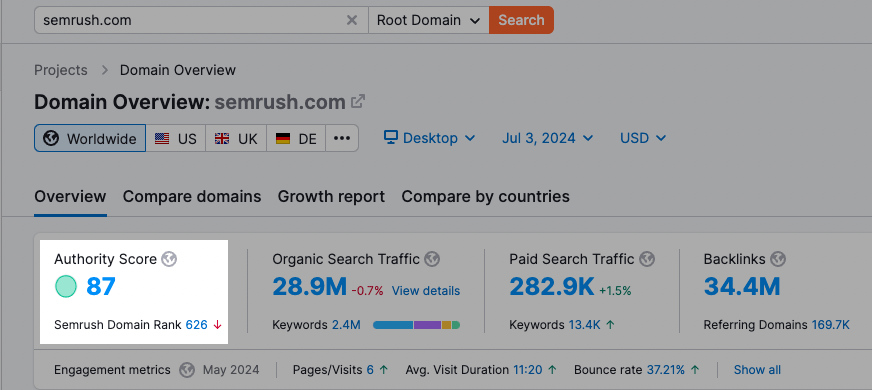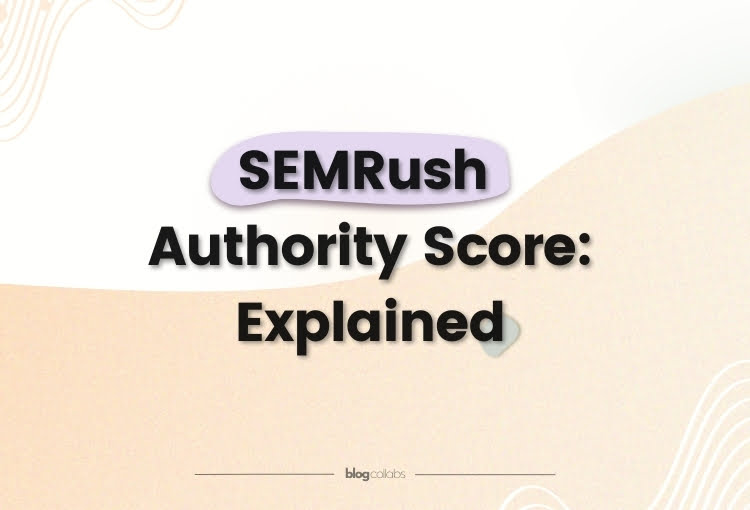What Is SEMRush Authority Score and How To Improve It
If you’re in the blogging world or a beginner researching SEO, you may have stumbled across something called SEMRush and another thing called Authority Score.
It’s almost like a second language, full of buzzwords and industry lingo… grab an iced coffee as we digest just one of the many site metric tools out there, and learn how to game the system. Sort of.
About SEMRush Authority Score
There’s not much that could sound more dull than “Authority Score”, except maybe “tax forms”… But if you’re looking for ways to improve your blog’s rep and rake in some cash, the SEMRush Authority Score is something to sit up and pay attention to. So what is it and, more importantly, what can it do for you?
About SEMRush Authority Score
There are few better dreams than making a living from being a blogger or influencer. But to do that, you need to learn a few things. Digital marketing tools aren’t just useful for you—they’re also used by the people who can line your pockets.
SEMRush is just one of the most popular digital marketing suites. It’s used by businesses of all sizes to gain insight into their online marketing activities, from SEO to PPC, content marketing, PR, and more.
The SEMRush Authority Score gives an overview of the quality, trustworthiness, and SEO performance of a domain or web page. At least according to SEMRush’s algorithms. The idea for all of these metrics that assign a ‘score’ to your website is to work out how valuable your site is to search engines.
The score is logarithmic, from 1 – 100. A score of 1 doesn’t necessarily mean anything bad, just that your site doesn’t have enough trust signals to establish a good Authority Score.
Where can you find out your Authority Score?
You’ll see it in a few places on the SEMRush platform, including when searching for a domain/web page in Domain Overview, Backlink Analytics, Backlink Audit, or the Link Building Tool. So you can’t really miss it.

By now, you might be thinking ‘OK, but why should I care about it?’ If you want to be paid to place backlinks or improve your own website’s backlink profile, you can’t ignore the all-powerful SEMRush Authority Score. But how exactly is an Authority Score calculated?
An Authority Score is calculated using AI and machine learning, taking into account three main factors.
- Link Power, which is the quality and quantity of backlinks to the domain or page.
- Organic Traffic, an estimated average amount of organic traffic each month.
- Spam Factors, which may indicate whether links are spammy or natural.
These three factors are weighted differently, with Link Power having the heaviest weighting, then traffic, followed by Spam Factors.
What is a good Authority Score?
Now you know what the SEMRush Authority Score is and how it’s calculated, next is what makes a good one. SEMRush says Authority Score should be used for comparison, not to determine an absolute “good” or “bad” score for a domain. So it’s more like grading on a curve than a pass or fail.
In more general terms, the higher the score is, the more authority the domain has. The scale is from 1 to 100, so the closer to 100 an Authority Score is, the better it is.
Compare your Authority Score with others using Backlink Analytics. Start by entering your domain and clicking “Analyze”. You can then enter competitors in the “Add competitor” field, with the option to add up to four. You will be given a. chart that compares the scores of your domain and your competitors.
Real Uses for Authority Score
OK, digital marketers use Authority Score to judge your blog. So why should you care? How can Authority Score actually help you? If you’re a blogger or influencer who wants to make it big, this nifty little number can actually have a big impact.
Here are some of the ways you can use it:
Find people to partner with
Authority Score isn’t just something others use to assess your blog. Partnering up with others is an awesome way to grow your blog, but there’s one question you always need to keep asking: what’s in it for me? You can use Authority Score to get nosey and find out more in-depth information about other bloggers or partners you potentially want to team up with. Compare their Authority Score to your own and to other sites in their niche to see if they’re worth your time.
If you’re looking for sites to place a backlink, for example, you’ll want to know that their score puts them in a good position. There’s no point working with small fries if you’re looking for the big catches.
Improve your earning opportunities
Your own site’s Authority Score deserves your attention too. The people you want to work with (like sponsors, advertisers or affiliates) could be using Authority Score to decide if your blog is right for their campaigns. And we all know that it’s not easy to get ahead when you’re facing a lot of competition. Boost your score and you’ll stand out among the others in your niche. You can include your Authority Score in your media pack, pitch or any other information you send to people you want to work with.
Boost SEO performance
Authority Score isn’t directly linked to Google or other search engines, but a good Authority Score is also great for improving your search engine rankings. Authority Score shares some metrics that search engines also care about. A good backlink profile is important for ranking well in search engines and it matters for SEMRush’s Authority Score too.
How to Improve Your Blog’s Authority Score
You don’t want to ignore Authority Score if you’re hoping to make it big as a blogger. If your Authority Score is looking lifeless, here are some of the things you could be doing to boost it.
Get Quality Backlinks to Your Blog
As Link Power is one of the important factors used to assess a domain’s Authority Score, paying attention to backlinks should be a priority for you. And you don’t need to be an SEO genius to beef up your backlink profile.
To get good backlinks to your blog, you first need to be publishing content that people want to link to. The more you post useful, entertaining content, the more other site owners will naturally link back to your blog. Don’t worry about playing the waiting game, twiddling your thumbs until you get natural links. You can also reach out to relevant sites and ask them if they would be willing to link back to your blog.
Take a look at this case study to see how to build links and really get results. 10% of the people they contacted resulted in links, including from high-authority sites and educational resources (which are great to get links from). It might take some work, but it’s worth it if you want to raise the authority of your blog.
If you’re already using SEMRush, you can use their Link Building Tool to help you identify the right sites to link back to your blog. Enter keywords related to your content, and then generate a list of competitors. You can manually add competitors too. When you ask the tool to start link building, it will generate prospects for you to target and show you their Authority Scores. You can even use SEMRush to start contacting them by clicking on “To in progress” next to a prospect, then clicking “Contact” and sending a message directly from SEMRush.
Publish Great Content to Increase Traffic
Organic traffic is another major factor of Authority Scores. When you have more organic (i.e. not paid) traffic coming to your blog, it improves the authority of your domain. Using methods such as PPC ads to drive traffic to your site can be helpful, but it’s organic traffic that really helps your blog perform well in the long term. More traffic means better SEO (and domain authority), and better SEO means more traffic.
The problem is, this kind of creates a problem. If you need more traffic to boost your blog’s authority but you also need good authority to get more traffic, how do you get started? But don’t panic if you don’t know where to begin. You can increase your organic traffic even if you don’t have an amazing Authority Score. And as your traffic grows, you’ll start to see your score tick upward too.
As with backlinks, this is another thing that requires good content. If you’re publishing content that’s relevant to your target audience and offers them good value, you’re more likely to get more traffic. Valuable content will be well-regarded by search engines, helping your site rank better in search engine results and driving more traffic. It should go without saying, but that means you shouldn’t be posting about ice cream if your target audience is looking for dog care tips. And don’t just rehash what everyone else is doing. Provide more value by being different.
There are tons of ways to get more traffic to your site. These tips from SmartBlogger show how various strategies can help you get started. Their advice includes:
- Reverse engineering your competitors’ content
- Find out what your readers want by asking them or observing them
- Paying attention to data when choosing blogging topics
- Use captivating headlines
- Make your content credible
- Add images
When it’s time to create your content, remember it needs to meet the search intent of the user. In other words, what is the user looking for when they search for your target keyword? Your content also needs to be trustworthy, providing accurate and valuable information for readers.
Remove Bad Backlinks
Bad backlinks are like being recommended by an untrustworthy person. You’re going to be judged if the shifty guy in the corner says you’re solid. In the same way, links that look spammy will be counted against you in your Authority Score. But what can you do about poor-quality links? You’re not the one creating those links so it might seem kind of unfair that they count against you.
There are a couple of ways you could make sure bad links aren’t damaging your Authority Score. The first is to directly appeal to the owner/admin of the site where the link is placed. You can get in touch with them and request that the link be removed. If you’re using SEMRush, you can identify poor-quality links and get in touch with site owners using the Backlink Audit tool. Alternatively, you can manually find contact details. Craig Campbell is an SEO expert who can take you through how to use the audit tool and decide which links might need to be dealt with.
Another option is to disavow links. This should only be done if you’re sure backlinks from a particular site are damaging your site’s reputation. Google says you should only do this if there are penalties levied against your site. If you choose to do it, you can also use SEMRush to help, or find other tools to make the process easier.
Improve Internal Linking
External linking is important, but you shouldn’t neglect internet linking, either. The way the pages within your site are linked together contributes to SEO, helping both search engines and readers find more content on your blog. When you have a good internal linking structure, it helps search engines discover more pages by using the links to go from one page to another when crawling. Internal linking passes authority to other pages on your site too. It’s like continually telling search engines and digital tools like SEMRush “now look over there, that page is awesome too.”
If you want to improve internal linking on your site, there are a few strategies you could consider. One of them is topic clustering, which involves grouping posts that explore certain topics. When you use this strategy, you create a pillar post that explores the topic broadly and can link out to cluster topics, which address related subtopics in-depth. The cluster topic posts can link back to the pillar post too.
This case study from Niche Pursuits shows that improving your internal linking (and nothing else) can increase your ranking in search engines. Higher ranking means more traffic and backlinks, which means a better Authority Score too.
Make sure to check on your internal links periodically too. You want to ensure there are no broken links that could cause problems for your site.
List Your Blog on Related Directories
Another way to improve your blog’s SEMRush Authority Score is to look for online directories where you can list your blog. This can be especially useful if your blog is attached to a business or service you offer, but it’s still a strategy worth considering if you’re purely a blogger. Blog directories can tell search engines more about your blog, helping to increase your SEO performance and organic traffic. They can also help to directly send more traffic to your site and provide you with trustworthy backlinks.
Authority Score vs Domain Authority vs Domain Rating
SEMRush isn’t the only digital marketing company that uses these types of authority scores to rank the trustworthiness of domains. Other tools such as Moz and Ahrefs also use their own rating systems to help people assess domains and web pages.
Domain Authority
Moz uses Domain Authority (DA) to predict how likely a page is to rank in search engine results. Meanwhile, Ahrefs has created Domain Rating (DR), which shows the strength of a domain’s backlink profile in comparison to other sites. All three of these scores can be used to determine how well your blog is regarded by search engines and how it might be judged by people who can help you monetise your blog.
Moz’s Domain Authority is scored from 1 to 100, and is based on data from the Moz Link Explorer web index. It uses dozens of factors to calculate the score, using a machine learning model. Moz says that a site’s DA can fluctuate as its machine learning model gains new data. Larger and more established sites take up more of the higher DA positions. That means, according to Moz, it’s easier to grow your score from 20 to 30 than it is to grow it from 70 to 80.
Domain Rating
The Ahrefs Domain Rating (DR) focuses on the backlink profile of the domain. It compares it to the other domains in their database and assigns a score out of 100. To calculate DR, Ahrefs transfers more “link juice” to linked domains from domains with a higher DR. Source domains also equally split their rating among the domains they link to. DR depends on both the total number of high-DR sites that link to your blog and how many other sites those high-DR sites link to.
Ahrefs suggests that DR should be used to help choose which websites are good for link building. They also have other scores such as URL Rating and Ahrefs Rank (AR), which can be used to assess search engine ranking and other important factors.
As you can see, Authority Score, Domain Authority and Domain Rating all have slightly different aims and uses. However, they can all be useful if you’re trying to identify while sites are good for gaining backlinks. It’s also a good idea to have an understanding of how other site owners use these scores. If your aim is to monetise your blog through sponsorships, affiliate marketing or other methods, the people you want to partner with may put a lot of focus on these scores.
Improve Your Authority Score to Boost Your Blog
A higher SEMRush Authority Score could give you access to more opportunities for your blog. It will also help you grow your blog through methods such as link-building and improved organic traffic.







